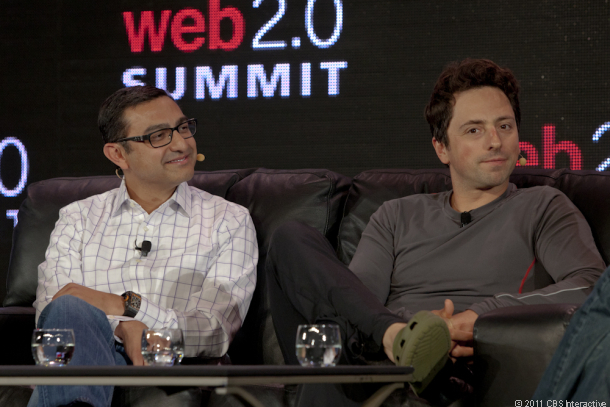Google+ opens up pages to businesses

Google has finally launched Google+ Pages, the business-friendly side of its social network and a key way for the company to compete with arch-rival Facebook.

Google's Vic Gundotra and Sergey Brin talked about Google+ for businesses at Web 2.0 in October. Photo credit: James Martin/CNET News
Pages, rolled out on Monday, are similar to personal Google+ profiles in that they let people engage with a business much as they would with anyone else over the network. From the business's side, the system makes it possible to add potential customers to various circles and address them in a segmented way.
"For you and me, this means we can now hang out live with the local bike shop, or discuss our wardrobe with a favourite clothing line, or follow a band on tour. Google+ Pages give life to everything we find in the real world," Google engineering chief Vic Gundotra said in a blog post on Monday. "And by adding them to circles, we can create lasting bonds with the pages (and people) that matter most."
There are some differences between personal profiles and Google+ Pages. For example, in a move likely to combat spam, pages cannot add people to circles until they themselves have been added first. The default privacy setting for pages is 'public', although posts can be made private. Pages also cannot play games, '+1' other pages or take part in a video Hangout on a mobile device.
Perhaps frustratingly for administrators, pages also do not provide activity notifications via email, text or the Google bar. However, a business can add a Google+ badge to its site that allows people to add its page to their circles without leaving the site.
The main rival to Google+ pages is Facebook Pages, which is another way for businesses to inject themselves into customers' social-networking experience.
Facebook still offers a much larger audience to business users, but Google+ makes it possible to conduct multi-person business-to-customer videochats, using the Hangouts feature. Crucially, Google has also closely integrated its version of the business pages idea with its search engine.
Google+ pages show up in search results, but they also benefit from a feature called Direct Connect, Gundotra explained.
"Maybe you're watching a movie trailer, or you just heard that your favourite band is coming to town. In both cases you want to connect with them right now, and Direct Connect makes it easy — even automatic," Gundotra wrote. "Just go to Google and search for [+], followed by the page you're interested in (like +Angry Birds). We'll take you to their Google+ page, and if you want, we'll add them to your circles."
At the moment, Direct Connect is only available for a limited subset of pages, such as +Google and +Pepsi. According to Google's support page for the feature, not every Google+ page will be able to use Direct Connect, and eligibility is "determined algorithmically, based on certain signals we use to help understand your page's relevancy and popularity".
Google also looks for a link between the business's Google+ page and main website, so inserting a Google+ badge onto that main site is another way to increase the chances of Direct Connect working.
There is also a specific type of Google page called a 'local page'. In common with the free Google Maps listings for small businesses, this is quite easy to set up and includes a map of the business's location as well as details of address, phone number and hours of operation.
Google has taken some time to roll out the business functionality of Google+. The social network first launched in June, albeit in private beta. Within a month, Google had expressed keenness to dive straight into the business market with a limited trial and then almost immediately backtracked on those ambitions, saying there was not enough value in such a limited test. In addition, several companies had set up Google+ profiles when the service launched, only to see Google take those profiles down as it said the beta was for individuals only.
It was not until the end of October that individual Google Apps customers were even allowed into Google+. Now, enterprise Apps users are in and able to build brand-based pages.
However, Gundotra suggested more is to come, with Google+ pages perhaps gaining greater functionality in future.
"With Google+, we strive to bring the nuance and richness of real-life sharing to software," Gundotra said. "Today's initial launch of Google+ Pages brings us a little bit closer, but we’ve still got lots of improvements planned, and miles to go before we sleep."